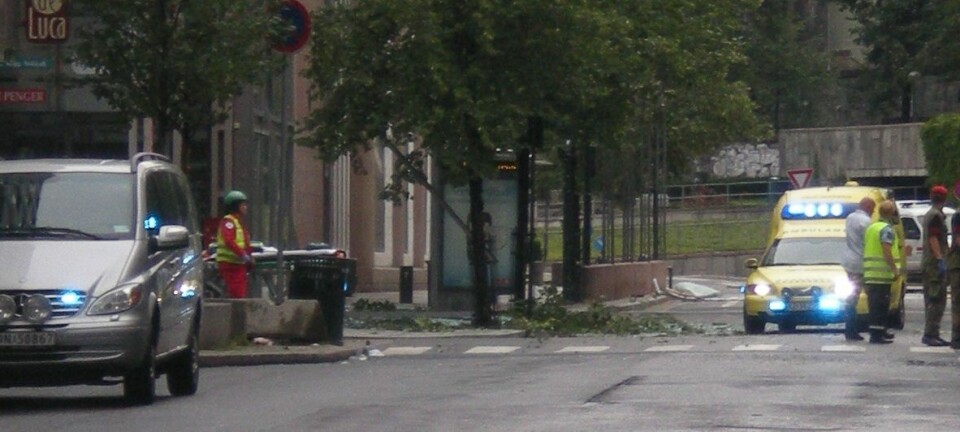
Firing the boss is not always smart
Norway's police director resigned yesterday as a result of criticism from the July 22 commission, which investigated last year's terrorist attacks. But axing the bosses often has little more than symbolic value.
Denne artikkelen er over ti år gammel og kan inneholde utdatert informasjon.
The recently issued report from Norway’s 22 July Commission, which probed the emergency response and all that went wrong on that day of terror in 2011, has sharply criticised the police and other officials.
It concluded that Norway’s preparedness was insufficient and that the government and police erred in a number of ways
The police director in Norway, Øystein Mæland, has now resigned, and other officials might follow.
But removing the executives in an organisation when big blunders are made isn’t necessarily a good idea, according to Jan Ketil Arnulf, an assistant professor of the Department of Leadership and Organizational Behaviour at the Norwegian Business School (BI).

“The problem is simply that if you get rid of the persons who made mistakes you also get rid of your opportunities to learn from them,” he says.
Bitter experiences are wasted
The resignation of the person in charge – whether a political party leader after a disastrous election, a corporate director after a company’s stocks plummet or the skipper who runs his ship aground – is common practice and originally stems from the maritime trade.
“In the financial world and in shipping, if you’ve been assigned with managing other people’s fortunes in a crisis situation and don’t get it right, you’re expected to step down. This is why they say a captain should go down with the ship: you can’t return home when the wealth you were supposed to protect is left in your wake,” explains Arnulf.
He has previously studied the effect of ousting a manager in a less serious situation − in the world of football.
But the problem is that the manager who has lived through the crisis, and who has just learned the nitty-gritty about what and how things go wrong, is the person who now knows how to avert a new crisis
In this case it’s not a good idea to remove such expertise and hire someone who’s apt to make the same mistakes all over again.
“Of course it’s a wholly different matter if the boss continues to make the same blunders – that eradicates any confidence. But an organisation that criminalises mistakes becomes an organisation where it’s impossible to learn,” says the researcher.
Nonsense to fire the new PST boss
Over a year has passed since the 22 July attacks and in the meantime many of the bosses with responsibilities pertaining to terror prevention and emergency responses have quit or retired, officially for other reasons.
Former Minister of Justice Knut Storberget left by choice, and the former Norwegian Police Security Services (PST) boss Janne Kristiansen had to resign.
Arnulf thinks the firing of the present minister of justice or head of the PST would be uncalled for.
“It’s nonsense to remove persons who haven’t even made a mistake simply because they’ve taken on a position. A lot of dirty laundry is going to be exposed and they have a whole government to remove if they want to fire somebody. But firing people who didn’t have anything to do with the case is punishing the wrong person,” he says.
Can provide some closure
However, Arnulf thinks some arguments can be made for dismissing the heads of agencies that have come under fire after the commission report, even if they have essential experience or have risen to their positions after the terrorist attacks.
“The controversy around this report can lead to lots of crass communication; much can be fairly biased and emotional. Eventually this could be counterproductive for the process the report is really about, learning from the mistakes that were made. So it can be a good thing to get such disturbances out of the way," he says.
“In this context there’s the practice of ousting a leader to get some closure and calm things down so the real tasks can be tackled.
“Here we have agencies in our society that are fundamental to political stability and it’s vital that people retain confidence in them. In such cases I’d say it’s right to remove those who are responsible.”
In any case the researcher warns that the report shouldn’t be mistaken for “the truth” about what happened during the terrible hours last July.
“The commission is not a legal body with all the right answers or perfect judgement. Its report should be viewed more as a part of the general collective interpretation of what happened and I’m convinced we’re going to witness that it generates a lot of spin,” he says.
“It’s essential that we differentiate between the process of targeting those who made mistakes and learning from their errors, and the inevitable playing out of political agendas.”
Read the Norwegian version of this article at forskning.no
Translated by: Glenn Ostling

































